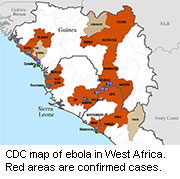- Could Your Grocery Store Meat Be Causing Recurring UTIs?
- Are You Making This Expensive Thermostat Error This Winter?
- Recognizing the Signs of Hypothyroidism
- 10 Strategies to Overcome Insomnia
- Could Artificial Sweeteners Be Aging the Brain Faster?
- Techniques for Soothing Your Nervous System
- Does the Water in Your House Smell Funny? Here’s Why
- Can a Daily Dose of Apple Cider Vinegar Actually Aid Weight Loss?
- 6 Health Beverages That Can Actually Spike Your Blood Sugar
- Treatment Options for Social Anxiety Disorder
WHO Admits Botched Response to Ebola in Africa


The World Health Organization has admitted it dropped the ball with the Ebola epidemic in West Africa, according to a news report published Friday.
In a draft internal memo obtained by the Associated Press, WHO blamed incompetent staff and other factors for not curbing at the outset what is now the largest Ebola outbreak in history.
“Nearly everyone involved in the outbreak response failed to see some fairly plain writing on the wall,” WHO officials said in the document, according to the AP. In a region with substandard health systems and unsealed borders, it should have been apparent that the usual infection-control methods wouldn’t work, the U.N. health agency memo said.
As of Wednesday, 4,493 people had died out of 8,997 reported cases of Ebola infection, according to WHO. Nearly all cases and deaths have occurred in Guinea, Liberia and Sierra Leone. WHO officials now say that there could be 10,000 new cases of Ebola every week within two months if the battle against the deadly virus is not stepped up.
Blasting its own bureaucrats, the WHO memo said the heads of the agency’s national offices in Africa are “politically motivated appointments” made by the WHO regional director for Africa. As a “particularly alarming” example, it said the head of its Guinea office wouldn’t help get visas for Ebola experts trying to enter the country. So far, Guinea has had more than 840 deaths attributed to the virus.
One of the scientists who discovered the Ebola virus echoed the criticism. “It’s the regional office in Africa that’s the front line,” Dr. Peter Piot told the AP on Friday. “And they didn’t do anything. That office is really not competent.
“I called for a state of emergency to be declared in July and for military operations to be deployed,” Piot told the news service. The agency finally declared Ebola an international health emergency in August.
That was five months and 1,000 deaths after the first cases were reported, Piot noted.
More information
For more on Ebola, visit the World Health Organization.
Source: HealthDay
Copyright © 2026 HealthDay. All rights reserved.










